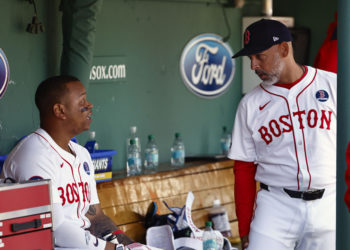Preston Damsky is a law student at the University of Florida. He is also a white nationalist and antisemite. Last fall, he took a seminar taught by a federal judge on “originalism,” the legal theory favored by many conservatives that seeks to interpret the Constitution based on its meaning when it was adopted.
In his capstone paper for the class, Mr. Damsky argued that the framers had intended for the phrase “We the People,” in the Constitution’s preamble, to refer exclusively to white people. From there, he argued for the removal of voting rights protections for nonwhites, and for the issuance of shoot-to-kill orders against “criminal infiltrators at the border.”
Turning over the country to “a nonwhite majority,” Mr. Damsky wrote, would constitute a “terrible crime.” White people, he warned, “cannot be expected to meekly swallow this demographic assault on their sovereignty.”
At the end of the semester, Mr. Damsky, 29, was given the “book award,” which designated him as the best student in the class. According to the syllabus, the capstone counted the most toward final grades.
The Trump-nominated judge who taught the class, John L. Badalamenti, declined to comment for this article, and does not appear to have publicly discussed why he chose Mr. Damsky for the award.
That left some students and faculty members at the law school, considered Florida’s most prestigious, to wonder, and to worry: What merit could the judge have seen in it?
The granting of the award set off months of turmoil on the law school campus. Its interim dean, Merritt McAlister, defended the decision earlier this year, citing Mr. Damsky’s free speech rights and arguing that professors must not engage in “viewpoint discrimination.”
Ms. McAlister, in an email to the law school community, also invoked “institutional neutrality,” an increasingly popular policy among college administrators. It instructs schools not to take public positions on hot-button issues.
But the question of how officials should respond to Mr. Damsky — who, in an interview, said that referring to him as a Nazi “would not be manifestly wrong” — is not merely academic.
Well beyond the classroom, bigoted and extremist views are on the rise and vying for mainstream acceptance, raising questions about whether principles of neutrality and free-speech rights are proper and adequate responses to the threats.
X, the social media platform owned by Elon Musk, recently allowed millions of people to view Kanye West’s new song saluting Hitler when other platforms removed it. Vice President JD Vance criticized European governments’ efforts to ostracize far-right political parties, on the grounds that doing so violates principles of free speech.
At the University of Florida, the story of the book award took a dramatic turn soon after Ms. McAlister defended the decision to honor Mr. Damsky with it. It was then, in February, that Mr. Damsky opened an account on X and began posting racist and antisemitic messages. After he wrote in late March that Jews must be “abolished by any means necessary,” the university suspended him, barred him from campus and stepped up police patrols around the law school. He is now challenging the punishment, which could result in his expulsion.
Mr. Damsky’s hateful posts drew shock and fear in some corners of the university. According to Hillel International, the university has the largest number of Jewish undergraduate students in the country. Its student body is 48 percent white, 22 percent Hispanic, 10 percent Asian and 5 percent Black, according to school data.
A spokesman for the university declined to answer questions related to this article or to make any administrators available for interviews. But in emails to Mr. Damsky obtained by The New York Times, university officials wrote that his posts had made numerous students fear for their safety. The officials also cited another student’s claim that Mr. Damsky had described his paper as concluding “on a call for extralegal violence,” which Mr. Damsky denies.
In an interview, Mr. Damsky said that he belonged to no organization or group, and that he did not pose a physical threat to anyone. He said he was being unfairly targeted for sharing his ideas, and blithely shrugged off the criticism. The disciplinary measures he faces could result in expulsion. He said he planned to fight them vigorously.
“You know,” he said, “I’m not, like, a psychopathic ax murderer.”
Mr. Damsky said his ideas were well formed before he started law school, shaped by reading authors like Sam Francis, a white nationalist, and Richard Lynn, who argued for white racial superiority and eugenics.
He grew up around Los Angeles and studied history at the University of California, Santa Barbara; he wanted to become a prosecutor, he said, after watching progressive-minded California prosecutors adopt policies that he believed were soft on crime.
Many law students learned about his extremism last fall, when a draft of a paper he wrote for a different class was passed among students and faculty members. Mr. Damsky, who just completed his second year of law school, assumes that a fellow student shared it with others. Like his paper for the originalism seminar, it also argued the Constitution was written exclusively for white people. It went on to suggest that nonwhites should be stripped of voting rights and given 10 years to move to another country.
In January, Carliss Chatman, an associate law professor at Southern Methodist University, began a stint as a visiting scholar at the school. It was not long, she said, before a number of Black and Jewish students came to her with concerns about Mr. Damsky.
Ms. Chatman was struck, in part, by her own experiences at the school in contrast to Mr. Damsky’s award. She had proposed teaching a class during her time there called “Race, Entrepreneurship and Inequality.” But administrators at the law school changed the name to “Entrepreneurship,” she said, before listing it in the course catalog.
She attributed the change to Florida lawmakers’ crackdown on diversity-oriented language and themes in public education, a push that preceded the Trump administration’s broader war on progressive ideology.
“I just find it fascinating that this student can write an article, a series of articles that are essentially manifestoes, and that’s free speech,” Ms. Chatman said, referring to Mr. Damsky, “but my class can’t be called ‘Race, Entrepreneurship and Inequality.’”
As the spring semester got underway, word spread that Mr. Damsky had won the book award in Judge Badalamenti’s originalism seminar.
Mr. Damsky’s paper includes arguments similar to those recently adopted by the Trump administration, including a call to “reconsider” birthright citizenship, and an assertion that “aliens remain second-class persons under the Constitution.”
It also argues that courts should challenge the constitutionality of the 14th Amendment, which ensures birthright citizenship, due process and equal protection under the law, and the 15th Amendment, which protects the right to vote for nonwhite citizens.
Mr. Damsky concluded the paper by raising the specter of revolutionary action if the steps he recommended toward forging a white ethno-state were not taken. “The People cannot be expected to meekly swallow this demographic assault on their sovereignty,” he wrote, adding that if the courts did not act to ensure a white country, the matter would be decided “not by the careful balance of Justitia’s scales, but by the gruesome slashing of her sword.”
Ms. Chatman called Mr. Damsky’s arguments “anti-intellectual” and absurd: “We fought a whole Civil War that freed slaves and said ‘We The People’ now means everyone.”
But it was the granting of the award that galled her the most.
“We should not be giving awards to things that advocate for white supremacy and white power,” she said, adding that she believed the award had “emboldened” Mr. Damsky to begin posting the racist and antisemitic comments on social media.
Mr. Damsky’s argument that at least some of the framers meant for the Constitution to apply only to white people is by no means a new one. Evan D. Bernick, an associate law professor at Northern Illinois University, notes that the argument can be found in the Ku Klux Klan’s founding organizational documents from the late 1860s.
Among originalists, though, this interpretation has been widely rejected. Instead, conservatives have argued that much of the text of the Constitution “tilts toward liberty” for all, said Jonathan Gienapp, an associate professor of history and law at Stanford. They also note that the post-Civil War amendments guaranteeing rights to nonwhite people “washed away whatever racial taint” there was in the original document.
While Mr. Damsky’s papers were written in a formal style consistent with legal scholarship, his social media posts have been blunt, crass and ugly. A critic of Israel’s war in Gaza, he argued in one post that President Trump and Secretary of State Marco Rubio were “controlled by Jews,” whom he called “the common enemy of humanity.” In posts about Guatemalan illegal immigrants, he said that “invaders” should be “done away with by any means necessary.” He lamented the “self-flagellatory mind-set” of modern-day Germans, noting their failure to revere Hitler.
Judge Badalamenti, who sits on the U.S. District Court for the Middle District of Florida, was one of two instructors of the class in which Mr. Damsky won the award. A member of the conservative Federalist Society, he has earned praise from both liberals and conservatives over the course of his career. The class was co-taught by Ashley Grabowski, a lawyer and Federal District Court clerk who, like the judge, is an adjunct professor at the law school.
Ms. Grabowski did not respond to a request for comment.
Mr. Damsky said he assumed that it was the judge who graded his paper. He also said that the judge “is not a white nationalist.”
“Don’t get me wrong,” he added. “I would prefer it if he was.”
Students took their complaints to Ms. McAlister, the interim dean. She addressed the granting of the award to Mr. Damsky in at least two town-hall-style meetings, according to an email she wrote to students and an article in The Independent Florida Alligator, the student newspaper. In the February email, the dean wrote that the law school, as a public institution, was bound by the First and 14th Amendments, meaning that no faculty member may “grade down a paper that is otherwise successful simply because he or she disagrees with the ideas the paper advances.”
Institutional neutrality, she wrote in her email, “is not agreement or complicity with the ideas that any community member advances.”
“It’s just that — neutrality,” she added. “The government — in this case, our public university — stays out of picking sides, so that, through the marketplace of ideas, you can debate and arrive at truth for yourself and for the community.”
Some at the law school agree with her stance. In an interview, John F. Stinneford, a professor at the university, said that it would be “academic misconduct” for a law professor who opposed abortion to give a lower grade to a well-argued paper advocating abortion rights.
If it were a good paper, he said, “you should put aside your moral qualms and give it an A.”
A number of students disagree, but several declined to be interviewed on the record for fear that criticizing the school, or a sitting federal judge, would harm their future job prospects.
One former student, who graduated in May, had his post-graduation job offer rescinded by a large law firm when he told them he had spoken to The New York Times for this article, criticizing Mr. Damsky’s paper and Judge Badalamenti for granting him the award. The student asked not to be identified for fear of jeopardizing other job offers.
Before his suspension, Mr. Damsky had been offered a summer internship in the local prosecutor’s office. But in early April, the prosecutor, Brian Kramer, the state attorney for the Eighth Judicial Circuit of Florida, rescinded the offer.
“You could imagine,” Mr. Kramer said in an interview, that “having someone in your office who espouses those kinds of beliefs would cause significant mistrust in the fairness of prosecutions.”
Richard Fausset, based in Atlanta, writes about the American South, focusing on politics, culture, race, poverty and criminal justice.
The post A White Nationalist Wrote a Law School Paper Promoting Racist Views. It Won Him an Award. appeared first on New York Times.




